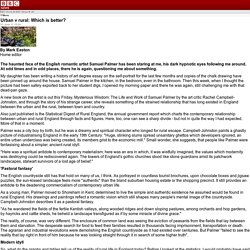

Is the gap year dead? Or just a waste of time? There was a time when our society believed that we all had at least one novel – and one gap year – inside us.
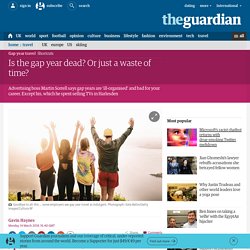
In Belgium, they have written this notion into law – their Time Credit system means every citizen is entitled to a total of one year’s paid leave across their lifetime. Yet, in the UK, it seems the tide has begun to turn against the sort of cliched multicultural chunder-fest skewered mercilessly by Matt Lacey’s YouTube smash Gap Yah skit and Jack Whitehall’s Fresh Meat character, JP. The stereotyping is entrenched by real-life toe-curlers such as Jordan Jacobs. In December, the 21-year-old managed to spark an international manhunt after implying to his family that he had been kidnapped on the Thai island of Ko Phi Phi Don, before emerging, five days later, with the sheepish admission he had simply been “having a bit too much fun”.
Culture - Feral: The children raised by wolves. Ivan Mishukov, Russia, 1998 Despite the harrowing accounts in her series, Fullerton-Batten’s images tell a story of survival.

“All human beings need human contact, but for these children their whole life becomes focused on a survival instinct,” she says, asking “if those living in the companionship of wild animals were perhaps better off than those whose young lives were spent with no companionship at all.” Ivan ran away from his family at the age of four, feeding scraps of food to a pack of wild dogs and eventually becoming a kind of pack leader. He lived on the streets for two years, before he was taken to a children’s home. In his book Savage Girls And Wild Boys: A History Of Feral Children, Michael Newton wrote that “The relationship worked perfectly, far better than anything Ivan had known among his fellow humans.
10 ways the UK's eating habits have changed. Image copyright Alamy Figures charting the UK's changing food-buying patterns since 1974 have been released.
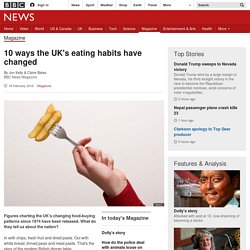
What do they tell us about the nation? In with chips, fresh fruit and dried pasta. Out with white bread, tinned peas and meat paste. That's the story of the modern British dinner table. Data from 150,000 households who took part in the survey of their food and drink habits from 1974-2000 has been published by the Department for Environment, Food and Rural Affairs (Defra). It comes from the National Food Survey, which in 1940 began asking households to fill out diaries of their weekly food and drink purchases. Together with studies that replaced it from 2000, the survey data offers a fascinating snapshot of the nation's shifting norms of dining and imbibing. Less white bread, less full-fat milk.
Why students need a global awareness and understanding of other cultures. As a languages teacher, it never ceases to astound me to think that the rasping, whistling and vibrating sounds emanating from our mouths and noses when you talk can be effortlessly decoded by our interlocutors as meaningful language, allowing us to communicate with one another in astonishing levels of complexity.
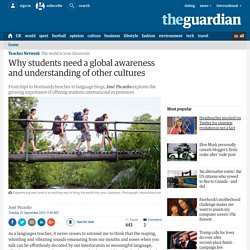
Language is a defining feature of people. In many western societies we might be tempted to assume that being able to speak and understand more than one language is the exception. Wide variations in migrant work statistics, report finds. Employment levels, wages and benefits vary widely between different groups of migrants in the UK, analysis suggests.
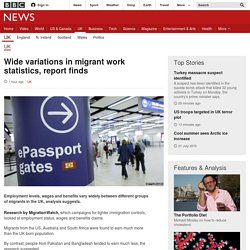
Research by MigrationWatch, which campaigns for tighter immigration controls, looked at employment status, wages and benefits claims. Skilled workers immigration cap hit. The government's immigration cap for non-EU skilled workers has been hit for the first time, blocking the arrival of some nurses, doctors and teachers.
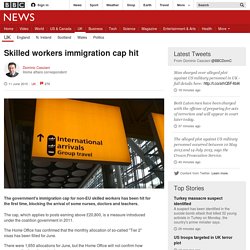
The cap, which applies to posts earning above £20,800, is a measure introduced under the coalition government in 2011. The Home Office has confirmed that the monthly allocation of so-called "Tier 2" visas has been filled for June. There were 1,650 allocations for June, but the Home Office will not confirm how many applications it received. The BBC understands that as well as nurses, doctors and teachers other visas refused were applications to bring in accountants, solicitors and management consultants.
Under the Tier 2 scheme, there are 20,700 posts available a year to employers who want to recruit a non-EU skilled worker. Applicants have more chance of success if the company is trying to fill a post on a national list of shortage occupations. Why immigration matters in this election. Immigration was one of the top subjects of public debate in the 2015 general election - but amid all the arguments and controversy, what do we know for sure about what is going on?
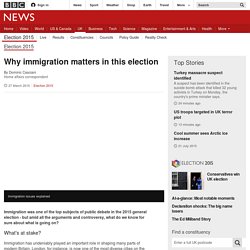
What's at stake? Immigration has undeniably played an important role in shaping many parts of modern Britain. London, for instance, is now one of the most diverse cities on the planet, a place where scores of languages can be heard on the streets. It began in the decades after the World War Two, with largely Commonwealth workers filling labour shortages. The NHS is the most obvious sector of society that is reliant on immigration: around a third of its workforce was born abroad. But the big unanswered question about migration is whether its forces have a wider positive or negative impact on the economy and society.
Do foreign workers price home-grown labour out of the market place? What role does fast-changing immigration play in key decision about planning for health, education, housing and other services? Rural History - Urban Dreams and Rural Reality: Land and Landscape in English Culture, 1920–45 - Cambridge Journals Online. SERP PB2_Final. Urban v rural: Which is better? By Mark Easton Home editor.
